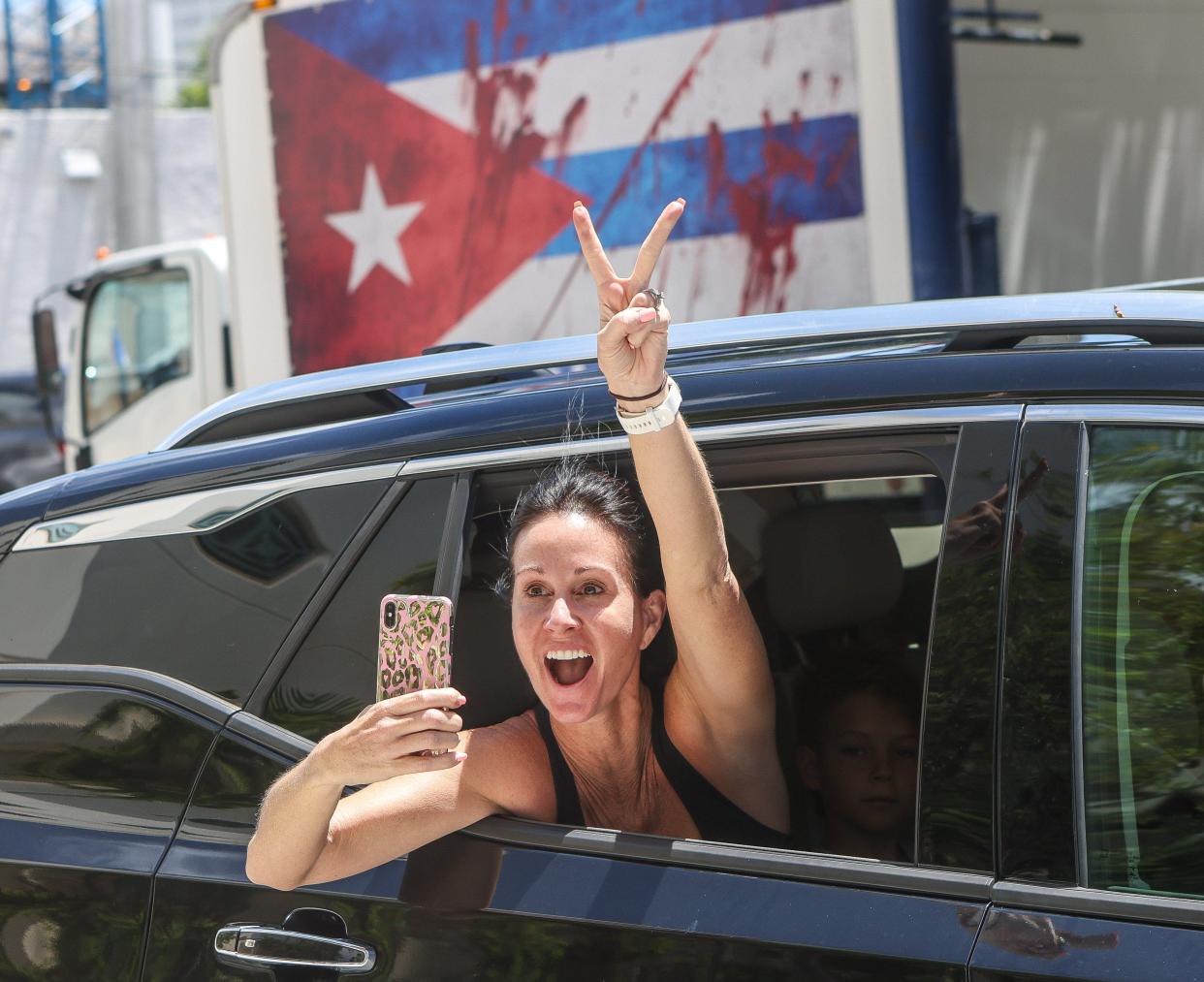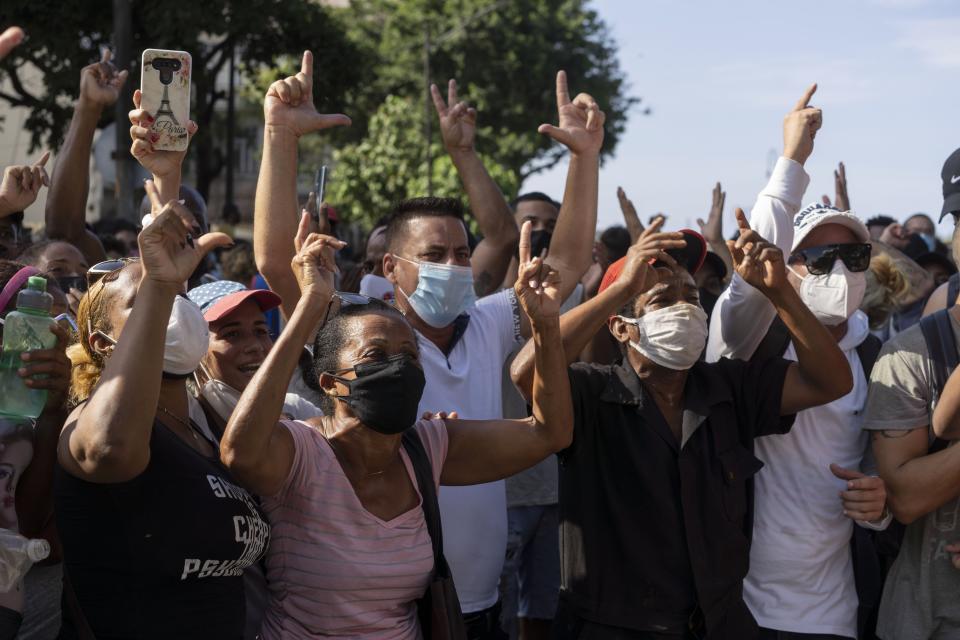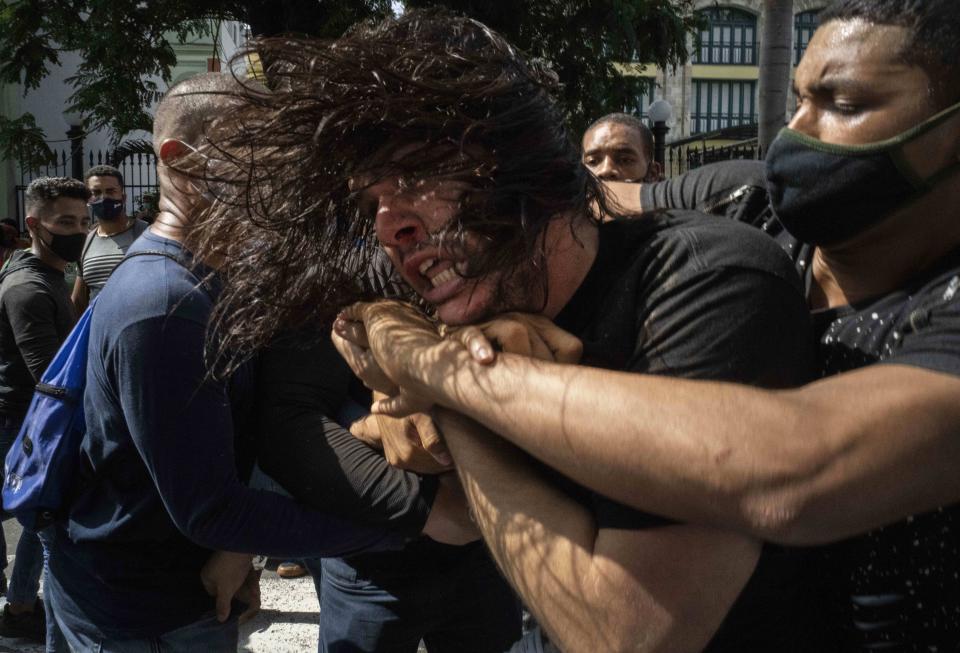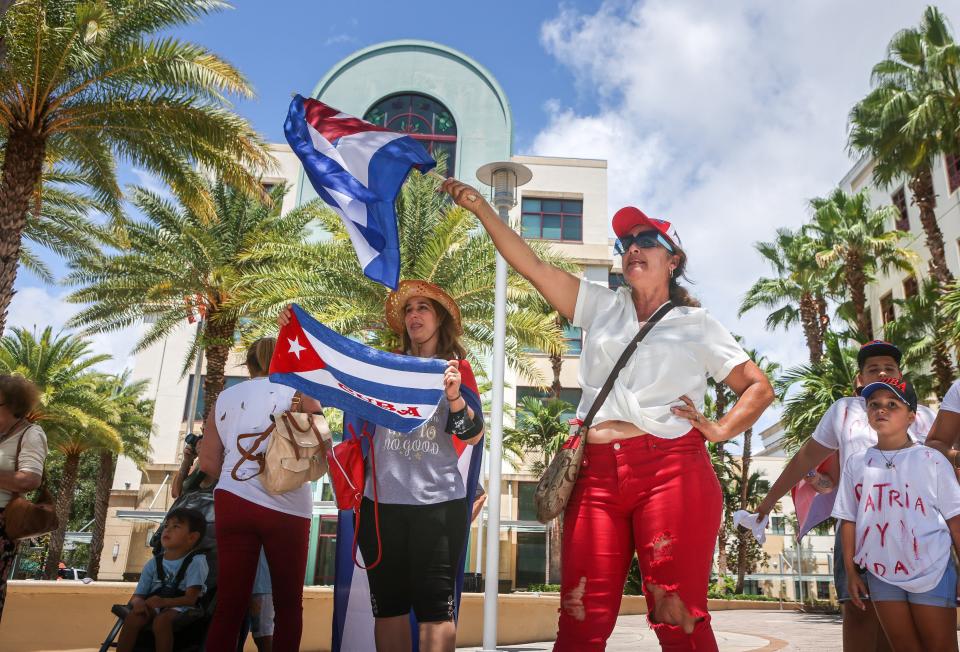Social media, independent press at core of Cuba uprising. A lesson for US policy?

Only in Cuba does Guennady Rodriguez, an attorney who once worked for the island's Catholic Church, fit the profile of an enemy of the state.
Rodriguez is one of the untold numbers of expatriate social media influencers, along with independent media and citizen journalists on the island, that Havana's communist regime blames for the outbreak of protests by Cubans.
More: 'Revolution is coming': Cuba protests cheered by Florida exiles
His 23 y Flagler website and YouTube channel, named after major streets in Havana and Miami, picks up videos and reports from Cuba, adds commentary and helps propel them to viral status.
"When someone shows something that happened in Cuba, in a video, we try to make it visible," said Rodriguez, 40, who came to the U.S. in 2013.
The protests demanding freedom and criticizing government failures leading to food shortages, power outages and an alarming rise in coronavirus infections and deaths first broke out in dozens of Cuban cities July 11. Since then, the social media-sphere has been the world's eyes and ears on Cuba — sharing and disseminating images of street marches and the crackdown that followed.
More: Anti-government protests in Cuba spark Florida solidarity rallies
The intense protests are not unprecedented. But it is the first time widespread unrest has been webcast to the world — bypassing Cuba's state media veil — and spurring solidarity protests far beyond South Florida, to Washington D.C., New York, Madrid and Los Angeles.
"Those people around the world are protesting, clamoring for freedom in Cuba because they heard and saw their brothers and sisters in Cuban streets asking for freedom," Rodriguez added. "What happened in Cuba was historic. I believe it was a turning point."
A turning point partly made possible by the development of independent media within the totalitarian state over the past 30 years. That effort got an assist from global civil society and the expatriate friends and families of Cubans who contributed camera phones and paid for data usage from abroad — enabling multitudes of citizen journalists to hit the streets and bring the world with them via their smartphones.
"The irony, of course, is the internet access people used to viralize the protests came from the Cuban government," said Theodore Henken, co-editor of Cuba's Digital Revolution: Citizen Innovation and State Policy. "It wasn't from [Radio and TV] Martis, or the U.S. government. It was the Cuban government that provided the channel."
Castro regime opened internet to tell truth about Cuba. It has.
It is an incongruous and parallel reality. Cuba, an island of 11 million people suffering massive scarcities of food, medicine and basic necessities, also lists 7.1 million internet users, 55% of whom access social media platforms and 3.4 million who connect to the internet from their smartphones.
Henken's co-editor on Cuba's Digital Revolution, Sara Garcia Santamaria, cautions those official government statistics from 2020 are not as impressive as they seem. For starters, she said, Cubans don't have 24/7 internet connectivity. And when they do log on, connections are poor and the service spotty.
Nonetheless, Garcia Santamaria can attest that Cuba's online access "is still higher than you would think" as people, noticing her as a foreigner, would approach her on the street asking for help in setting up Facebook accounts.

She said Cuban officials offered internet access in the 1990s to artists, doctors, journalists, and professors thinking it would suit the government's propaganda efforts.
"The deal was they had to use the internet to open up a blog and support the government," said Garcia Santamaria, who teaches mass communications at a university in Barcelona, Spain.
But rather than tow the government line, they reported on the reality around them. The journalists, bloggers and others Garcia Santamaria has interviewed said they originally didn't seek to be voices of dissent. Rather, she said, they did what journalists do, report and disseminate.
Over time, the reality they displayed to the world simply strayed farther and farther from the official "truth" — the narrative the government wanted to be told — to a far more critical and scrutinizing portrayal of reality on the island.
"The government gave them a tool to tell the truth about Cuba," she said. "And they did."
And the result, Henken added, is the reality in Cuba has been "exposed."
"Anyone who doubted people didn't want change in Cuba have been revealed to be misinformed, that's very clear around the world," he said Henken. "The idea that the U.S. is the problem, or that Cubans really like their system, has been exposed to be a false idea."
Many smartphones in Cuba came from abroad and data usage was covered there, too
Henken said many Cuban journalists were trained at the University of Havana and other institutions of higher learning. They then took jobs at state-run media outlets, like Granma and Trabajadores, before "they decided they couldn't take it anymore and decided to go off on their own."
Henken, a professor of sociology and Latin American studies at Baruch College, rattled off a list of websites including CubaNet, ADN Cuba, Cyber Cuba, Diario de Cuba, El Estornudo, El Toque, Periodismo del Barrio and 14 y Medio, to illustrate the proliferation of media outlets.
He said the independent journalism sites that started in Cuba within the past five years operate as "transnationals," meaning with some foreign role.
"With WhatsApp and all the different technologies, they can actually collaborate real time with reporters on the ground in Cuba and they run the sites from abroad," Henken said.
Then there are the citizen journalists who accessed social media platforms — again, initially to share photos and connect with family abroad — to post videos from the street protests. They were able to do so, in many cases, with smartphones handed to them by loved ones visiting the island, or paid for with wages from their self-employment jobs, plus rules that allowed friends and family members abroad to pay for their data usage.
"They have YouTube channels and do live reports, as they have seen people do in other places," Garcia Santamaria said. "Cubans are not as isolated as you think."
The rise in cellphone usage coincided with a spate of non-political protests in recent years as the government permitted marches and demonstrations related to animal rights campaigns, calls for lowering internet costs and other causes, Garcia Santamaria added.
"These protests came with social media campaigns," she said. "It opened a window where people learned they could actually march, protest, that it was an option. That's another important element."
U.S. policy not a major player in Cuba mass media explosion
Less of a player in this effort has been the U.S. government.
While the U.S. Agency for International Development and the National Endowment for Democracy provided funding for Cuban-focused digital media, Washington has long invested the bulk of its mass media budget on over-the-airwaves broadcasts by Radio and TV Marti, emphasizing 20th-century technology even as Cuba's citizenry embraced 21st-century platforms.
There lies the potential lesson for U.S. policymakers, and "Cuba libre" demonstrators in Florida and elsewhere.

The rise and role of independent journalists that put the Cuba protests on websites and front pages around the world is a testament to engagement, Cuba observers say, not isolation. And an example of how organic, homegrown movements and organizations responding to nuances in Cuban society and living conditions can be assisted.
One area where the model presented by Cuba's independent press and social media influencers could be replicated is the free enterprise economy. And one of the leading proponents is an erstwhile Cuba policy hawk.
'Huge leap' in Cuba's digital economy a model for free enterprise economy
During President George W. Bush's second term, Republican Carlos Gutierrez, a former chairman and CEO of the Kellogg Company, led the U.S. Commerce Department and ardently defended the tightening of family dollar flows from America and limitations on travel.
He thinks differently now.
"I was very much a hardliner," said Gutierrez. "I say we have to think strategically. Because step back, and say, 'Has the strategy for the past 62 years had any impact?' Cuba has changed a lot more than we know and a big part of that change is you see a lot of iPhones on the streets."
Gutierrez credits President Obama's reopening policies that, he said, permitted the digital economy in Cuba to take a "huge leap" forward as U.S. companies, including Google, became players, and smartphones proliferated through the island.
"It's very fashionable to say those two years of Obama's opening up did nothing," he said. "Compare those two years to the past 62. Businesses were opening up. Cubans had hope. They were excited. They had their own restaurants, they had a taxi business, They had a plumbing business. There was economic energy."
There is the lesson, Gutierrez said.
"I don't think we are going to topple the regime. That is a realization I made when I was in government," he said. "The politics in Cuba will be decided in Cuba. What we can, what we can decide to do strategically, is help the Cuban people."
And just as with the "digital media explosion," he said, the same can be accomplished by promoting and bolstering free enterprise to "lessen the dependency" on the government and spur change.
That is why Gutierrez said he supports lifting caps on remittances, dollars people in the United States send to loved ones on the island. He also said the U.S. government should relax regulations on the sale of food and medicine to the island.
American companies are already the largest exporter of goods to Cuba, even with the embargo. But Gutierrez said U.S. policy requiring cash sales and banning 30-day credit extensions "make it very difficult" for Cuban businesses.
"The easy thing is to say is it will help the Cuban regime," he said. "It will help the Cuban people."
A Miami Democrat, former Congressman Joe Garcia, agrees but says immediate, urgent help to the island is necessary given the twin political and humanitarian crises.
He, too, demands the Cuban government release everyone they have arrested for protesting, and supports calls for the Biden administration to ship syringes to Cuba as a way of curtailing the coronavirus death toll.
"COVID kills capitalists and communists alike," he said.

Garcia also believes Cuban-Americans, including the 1.5 million in Florida, need to be part of an economic program — but that will require attitudinal changes along both shores of the Florida Straits.
"When asked, [the Cuban government] said they would treat Cuban-Americans like any other foreigner," he said. "No, you don't get to treat me like any other foreigner. I am part of the nation. I should have an advantage."
Official Havana has to change its mindset, and Garcia says he has told Cuban commercial authorities that much in a series of visits to the island.
Those changes need to include, he said, providing private property rights and guarantees to businesses. Cuban officials also need to allow small- and medium-sized businesses and the Havana chamber of commerce to register businesses in Cuba owned by Cuban-Americans.
Cuban exiles and immigrants alike also have to have their own epiphany, and envision a different end game in Cuba.
"Where this leads you to is an overwhelming question: What does victory look like for Cuban-Americans?" said Garcia, a former executive director of the anti-Castro lobbying group the Cuban American National Foundation.
Still hoping for the fall of the communist regime
On a Sunday afternoon in western Miami-Dade County, a worker at an assisted-living facility made a chagrined confession — she had signed an online petition calling for a U.S. invasion of Cuba. The worker, who has a daughter on the island, immediately said she regretted advocating violence that could put her own family in jeopardy, but said she did it in a moment of anger and desperation.
A man visiting his elderly mother said he understood her change of heart. But he insisted the reason the protests were taking place in Cuba was the result of the cutoff of remittance money and travel to Cuba by Americans and expatriates. Only when that money is not flowing to Cuba, he said, did the failures of a communist system being imposed on them by a dictatorship become clear to Cubans.
From Miami to Tampa to West Palm Beach, invasions and ending subsidies are sentiments widely expressed in solidarity protests for a free Cuba — defined as the sweeping away of all remnants of the Castro brothers' dictatorship.
Punishing and retributive Cold War policies are especially appealing in the face of the Havana regime's beatings and arrests of protesters. Last week, human rights groups reported that more than 700 people have been arrested, detained, or sentenced to jail terms.
Standing in the hall of the Brigade 2506 Museum and Library in Hialeah Gardens, adorned with photos of those who died in the last American-backed invasion of Cuba, Bay of Pigs veteran Jorge Gutierrez Isaguirre called for action.
"I don't have any faith in the [Biden] administration," said Gutierrez Isaguirre, a founder of the influential and revered Brigade 2506 group that had the ear of former President Donald Trump during his White House years.
To Cuba hardliners, Biden represents Obama. And Obama harkens to images of a U.S. president yucking it up with Raúl Castro at a baseball game.
By contrast, Trump has been the only U.S. presidential candidate the Brigade endorsed. And they were rewarded with influence in Cuba policy as the Trump administration rolled back the prior Obama administration's economic opening to the island.
Gutierrez Isaguirre said the demonstrations in Cuba prove that policies of rapprochement, like cruise ships loaded with partying tourists sailing into the island's ports of call, with the Cuban government now led by Miguel Diaz-Canel were a mistake.
Gutierrez Isaguirre said he would like to see a U.S. surgical strike, like the interventions in Panama to remove strongman Manuel Noriega or in Grenada to oust a communist leader. He doubts that will happen, but believes international pressure could still create conditions for the "toppling of the regime."
One thing is certain, he said.
"The demonstrations have put the lie to the vision of those who wanted to put their heads in the ground like an ostrich with a policy quasi-supportive of the Cuban regime," he said.
Regime change predictions 'wishful thinking'?
Those who have followed Cuba's social media and protest movements disagree.
"A lot of what they do in Miami is based on wishful thinking and not on a serious assessment of what impact they could have. All of that is a function of expectations that are not realistic," "And that's no way to effect change or support people on the island. They are often cut off from those currents."
Henken said more recent immigrants from Cuba, like 23 y Flagler's Rodriguez, may not be the ones driving U.S. policy, but they display a much "more nuanced understanding of Cuba and connection with Cuba."
For his part, Rodriguez warns against too much aligning with Washington, and definitely opposes military intervention.
"Cubans need to understand that they need to talk to each other and be in charge of everything that happens," he said.
And above all, he said, keep reporting and sharing.
Which some believe is what is at the core of today's protests.
Thirty years ago, the dean at the journalism school at the University of North Carolina at Chapel Hill took the first of more than a dozen groups of students to Cuba in what was arguably one of the earliest journalism-centric, U.S.-Cuba exchange programs.
Over the next quarter century, Richard Cole, assisted by grants from the MacArthur Foundation and others, would also bring Cuban journalism professors to the United States and assist deans at the other American universities in engaging mass media development on the island.
Cole says his goal was pretty simple.
"All I wanted to do was to get U.S. students to think more about freedom and democracy," Cole said. "And for Cuban students to see how a free press worked here."
This article originally appeared on Palm Beach Post: Independent press at core of Cuba uprising, with lesson for US policy?

